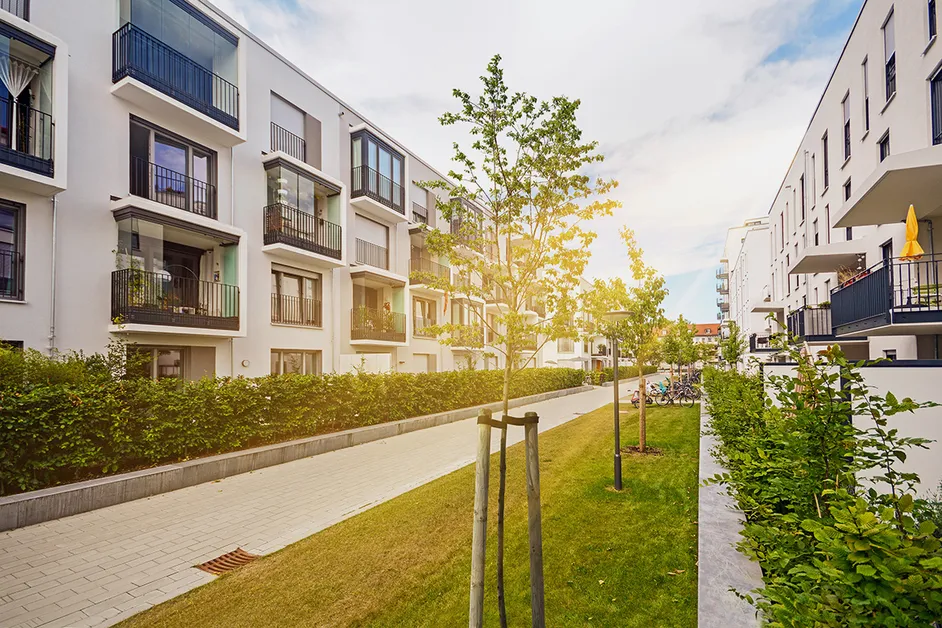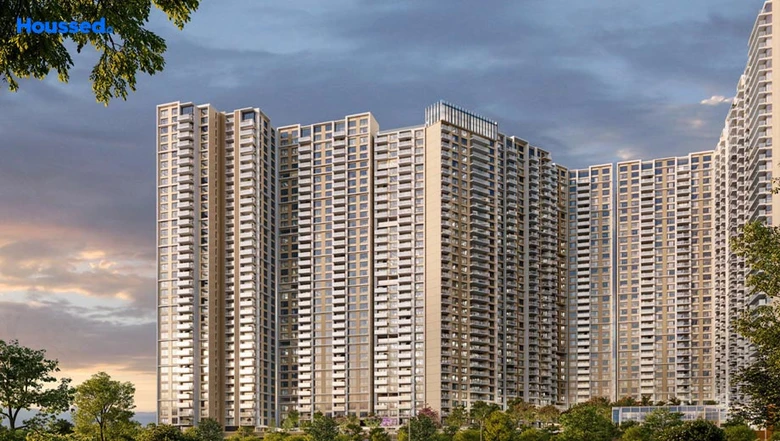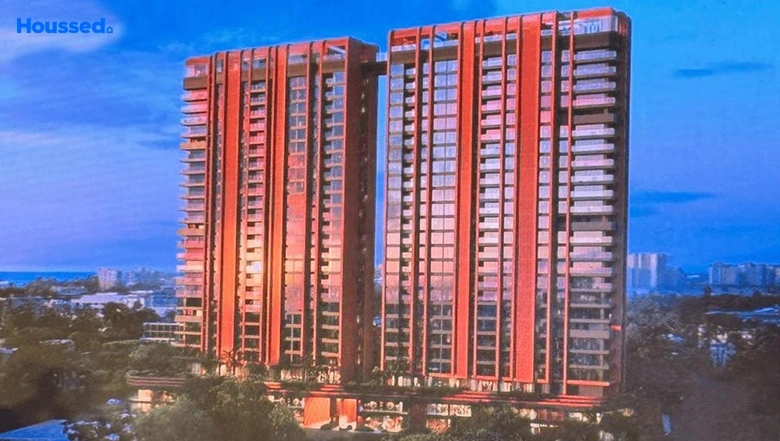West-facing House Vastu - Tips, Placement, Do's and Don'ts

According to Vastu, many people believe that north or east-facing houses are the luckiest. These are the top choices for most people. Only when they can't find one, they half-heartedly consider West-facing houses.
West-facing houses are considered unlucky because the sun sets in the West. But that's not true. A west-facing home can be just as lucky and bring abundance and prosperity if you follow certain Vastu principles.
What is Vastu Shastra for a West-facing House?
A west-facing home is categorized based on the main entrance facing the west. Despite recent negative perceptions, according to Vastu Shastra's fundamental principles, all orientations - north, east, west, or south - are considered equally auspicious, provided you follow the correct design guidelines.
In Vastu Shastra, the focal point is not the specific direction of the house but rather the positioning of the main entrance or door. If the main door opens towards the west, it is considered a west-facing house.
Who Can Buy a West-facing House?
Houses that face the West are great for people who have jobs like lawyers, doctors, nurses, chefs, detectives, financial advisors, teachers, politicians, artists, and gardeners. These houses make these people happy with their jobs. West-facing houses are also good for social workers. People who live in west-facing houses are often extroverts and tend to do well in life.
It's believed that individuals residing in west-facing homes are more likely to enjoy prosperity and a wide circle of friends. Such residents are expected to have no adversaries and will be well-liked in their workplaces, personal relationships, and social gatherings.
According to Profession
A west-facing house in Vastu may only be suitable for some, much like houses facing other directions. In Vastu Shastra, a west-facing house is considered auspicious based on an individual's specific needs and circumstances. This is because the setting sun in the west is associated with the water element. It is believed that for certain professions and personal situations, harnessing the energy of the setting sun can be advantageous, leading to improved emotional well-being and increased success in their respective pursuits. Individuals in these professions or life circumstances may find advantages in residing in a west-facing property.
- Lawyers and Legal Advisors
- Chefs and Culinary Professionals
- Animal Doctors
- Detective and Private Investigators
- Physiologists and Therapist
- Social Workers
- Financial Advisors
- Teachers and Tutors
- Landscaper Artists and Gardeners
- Doctors and Nurses
- Restaurant Owners
- IT Professionals
- Stock Market Traders
- Research and Development Professionals
- Real-Estate Brokers
- Media Professionals
According to Astrological Signs
Adhering to Vastu principles can yield positive results in west-facing homes as well. Moreover, astrology suggests that west-facing houses aren't universally unfavourable for every individual's horoscope, but people with the following astrological signs(rashi's) can opt for west-facing houses:
- Gemini (Mithuna)
- Libra (Tula)
- Aquarius (Kumbha)
Direction and Placement Plan for West Facing House
For those living in a west-facing house, specific Vastu placement tips can enhance the peace and happiness within your home.
Main Entrance Vastu for West-facing House
Place the main door in the 3rd, 4th, 5th or 6th section of your home's entrance to ensure positive energies and good vibes flow.
Bedroom Vastu for West-facing House
For restful sleep, it's important to harmonize your bedroom with natural elements. Select an appropriate location suitable for children's and guest rooms, such as the south, west, and northwest corners. In a west-facing house, the master bedroom is ideally situated in the south-western corner.
Dining Hall Vastu for West-facing House
According to Vastu Shastra, the ideal location for the dining hall in a west-facing house is in the northwest or west zone of the home to attract healthy living.
Kitchen Vastu for West-facing House
According to the vastu shastra, the southeast is the best direction for placing the kitchen in west-facing houses. Putting it in the wrong direction may cause financial and health problems.
Bathroom/Toilet Vastu for West-facing House
According to Vastu, the south of the southwest (SSW) and west of the northwest (WNW) are the ideal places for the septic tanks and east of the southeast (ESE) for the toilets in a west-facing house.
Pooja Room Vastu for West-facing House
According to Vastu Shastra, the most auspicious location for the puja room in a west-facing house is in the northwest corner of the house. This corner is associated with the air element and is considered favourable for spiritual activities.
Kids Room Vastu for West-facing House
In a west-facing house, the ideal location for a children's room is typically in the northwest or west direction, to promote a positive and conducive environment for their growth and well-being.
Office/Study Room Vastu for West-facing House
Vastu principles suggest the ideal placement for a study room or office in a west-facing house is in the northern or western sectors for productivity and well-being.
Advantages of a West-facing House as per Vastu
There are numerous advantages associated with a South-facing house, and here are some of them:
- Receives sunlight for longer durations.
- Good for people who are in politics, business, or teaching.
- Attracts more energy for youngsters.
- Attracts wealth and prosperity.
Disadvantages of a West-facing House as per Vastu
There are also some drawbacks associated with South-facing houses. Here are a few:
- It's difficult to have your entrance as per vastu principles.
- While Vastu rules say that the length of your plot should be in the east-west or north-south directions, this is difficult to achieve for a west-facing house plan.
Tips For West-facing House as per Vastu
For a west-facing house, consider these Vastu recommendations:
- Sturdy South and West Walls: Make sure that the walls on the south and west sides are thicker and taller compared to the others for stability and balance.
- Rectangular or Square Shape: Opt for a rectangular or square shape for the west-facing house, as this layout is auspicious and harmonious.
- Avoid Southwest Corner: Keep septic tanks, car parking, gardens, and water pumps away from the southwestern corner to maintain positive energy.
- Northeast Planting: Plant trees or large flowering plants in the northeastern part of the house to ward off negativity and promote a positive atmosphere within the home.
West-Facing Main Door
- Ensure the main door is well-maintained and inviting.
- Decorate the entrance with auspicious symbols or designs.
- Place a doormat inside the door to signify the transition from the outer world to the inner house.
Master Bedroom
- Position the master bedroom in the southwestern part of the house.
- The bed should be placed with the head towards the South or West for stability.
- Avoid mirrors or reflective surfaces facing the bed to prevent disturbances during sleep.
Children's Room
- Locate the children's room in the west or northwest sector.
- Keep the room well-organized and clutter-free to encourage concentration and creativity.
- Use soft, soothing colours to create a calming atmosphere.
Living Room
- The living room is ideal in the west or northwest direction.
- Ensure ample natural light and ventilation.
- Arrange seating in a way that fosters conversation and connection.
Kitchen
- Place the kitchen in the southeast corner, which is suitable for a west-facing house.
- Cooking should be done facing east.
- Keep the kitchen clean and well-ventilated to maintain positive energy.
Guest Bedrooms
- Guest bedrooms can be situated in the northwest or west sector.
- Provide comfortable bedding and essential amenities for guests.
- Decorate with neutral and inviting colours.
Windows
- Windows on the western side should be smaller than those on the eastern side.
- Use curtains or blinds to control the flow of natural light and energy.
- Keep windows clean for unobstructed views and airflow.
Eliminate Clutter
- Declutter regularly to maintain a clean and positive environment.
- Remove broken or unused items from the house to avoid stagnant energy.
Pooja Room
- Place the pooja room in the northeast corner or a dedicated space in the northwest.
- Keep it clean, well-lit, and adorned with sacred symbols.
- Perform daily rituals to maintain a spiritually charged atmosphere.
Staircase
- If you have a staircase, it's favourable in the southwest or northwest.
- Ensure it's well-lit and designed without any sharp edges or twists.
Wall Colors
- Choose wall colours that resonate with your personality and create a harmonious atmosphere.
- For a balanced feel, consider earthy tones like beige or light yellows.
Home Garden
- Maintain a garden in the northwest or western part of the house.
- Plant vibrant and healthy flowers and plants to enhance positivity.
- Avoid thorny or overgrown plants near the entrance.
Do's and Don'ts for West facing Home
Do's:
- Avoid sleeping under a big beam or wall in your room.
- Don't sleep with your legs pointing towards your bedroom door.
- If the land slopes from north to south, it might not be a good choice.
- Don't choose a property if trees or electric poles block the main entrance.
- Be careful with properties where the south and west sides are narrower than the north and east sides.
- It's not recommended to have the kitchen in the southwest area.
- In a multi-story house, avoid putting the kitchen directly under or above the bathroom, master bedroom, or prayer room.
Don'ts:
- Don't use the sunset to figure out which way is west for your property.
- Don't sleep under a beam or wall that separates your room.
- Avoid sleeping with your legs pointing towards your bedroom door.
- Don't buy a property if it slopes from north to south.
- Don't buy a property if things like trees or electric poles block the main entrance.
- Avoid properties where the south and west sides are thinner than the north and east sides.
- It's not good to have the kitchen in the southwest zone.
- In a multi-story house, don't put the kitchen directly under or above the bathroom, master bedroom, or prayer room.
Conclusion
For west-facing homes, it's crucial to stick to Vastu guidelines to foster good health, luck, and prosperity. Choose the direction based on your profession and zodiac sign.
West facing house is ideal for: Lawyers, Chefs, Doctors, Real Estate Brokers, IT-Professionals, Media Professionals and Financial Advisors with Gemini, Libra and Aquarius signs.
Direction and placement for West facing home: Kitchen in southeast, dining hall in northeast/west, master bedroom in south-west, pooja room in northwest and office/study room in north/west direction.
Pros of west facing house: Sunlight for longer duration, positive energy, ventilation, health, wealth, and enriched property value.
Cons of west facing house: Difficulty in finalizing entrance, limited backyard use, health concerns for specific zodiac signs.
Dos and don'ts for west facing house: Place the pooja room in the northwest and master bedroom in the southwest. Avoid blocking the main door and keep trash away from north or northeast.
FAQ's
According to Vastu Shastra, in a west-facing home, the house's main door or entrance needs to be located in any of the four padas – 3rd, 4th, 5th or 6th.
Whether a west-facing house is good or bad depends on personal preferences and needs. Vastu principles can provide sheer guidance.
West-facing house Vastu is about arranging rooms and things the right way to make your home feel good. It can help bring happiness and good energy into your house.
West-facing homes are ideal for people who are in the professions like politicians, teachers, religious leaders, and business people.
A west-facing flat in Vastu is ideal for professionals like doctors, lawyers, chefs, nurses, detectives, financial advisors, teachers, artists, and gardeners.
It is advised to locate the main door or the entrance in the 3rd, 4th, 5th or 6th pada on the west side for west-facing houses.
Living in a west-facing house has its own perks. You can enjoy the evening sun's warmth for longer. Plus, some individuals think it brings more wealth, fewer enemies, and popularity at work and in social life.
To fix Vastu issues in a west-facing house, consider adding elements like mirrors, plants, and lighting. Rearrange furniture and use colors wisely to balance the energy and harmony.
In Vastu for west-facing houses, key elements include directions for room placement, the strength of walls, and proper positioning of the entrance, windows, and rooms to ensure positive energy flow.
Living in a west-facing house means you can enjoy the warm evening sun. Some believe it brings wealth, fewer enemies, and popularity at work.
A west-facing house can get really hot in the afternoon and evening, making it uncomfortable. It may also have less morning sunlight, affecting some daily routines.
In a west-facing house, it's good to use warm and earthy colors like yellows, oranges, and light browns. These colors create a cozy and inviting atmosphere.
For west-facing houses in Vastu, key design rules include placing the main entrance carefully, positioning the kitchen and bedroom thoughtfully, and ensuring proper room layout and alignment.









